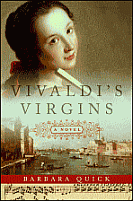Vivaldi's Virgins
 by Barbara Quick
by Barbara Quick

The
coming of age of Vivaldi's violinist
Barbara Quick's Vivaldi's Virgins is a coming of
age story set in 18th century Venice utilizing and transforming a
literary form popular during that era. As a violinist, the narrator
allows the reader to experience the richness of Vivaldi's music from a
perspective unavailable today to modern listeners. Barbara Quick
presents a vivid image of 18th century Venice and Vivaldi through the
eyes and life of the narrator Anna Maria. An orphan in the cloistered
halls of the Ospedale della Pieta, Anna Maria dal Violin has been
handpicked at an early age to join the elite musical group within the
foundling home and be taught by the maestro Vivaldi. Although
cloistered within the Pieta, the reader learns of Venice through those
who come to visit the Pieta and through the tours and secret escapes of
the curious girls.
Barbara Quick's novel removes the masks so carefully worn by the upper
strata of Venice society. Vivaldi is seen through the eyes of his
students and musicians. Vivaldi's Virgins is a combination of first
person narrative in which Anna Maria tells her life story and an
epistolary novel 'a novel told through letters', a genre emerging in
popularity during the 18th century. As a disciplinary measure, Sister
Laura instructs Anna Maria to write to calm Anna Maria's growing
passion. She writes letters to her unknown mother never knowing whether
they will be read nor by whom. Anna Maria lies hidden and almost
invisible, living behind a grille from the public. Barbara Quick's
novel removes the grille and allows the reader to peer inside the life
of this 18th century woman who cries out for her mother and makes
Vivaldi's genius heard by his public. Anna Maria dal Violin is the body
and the violin through which Vivaldi's music is heard. Images of the
voice of the violin and the voice of a child's body maturing merge with
the search for her mother and her prayers to the Virgin Mother. A
special plot twist at the end will delight all readers. This novel will
appeal to a wide range of readers: those craving something of literary
beauty, Vivaldi and classical music lovers, women wanting to experience
history through the eyes of the women who lived it but for whom history
rarely relates their story, and anyone wanting to peek into the lesser
known history of Venice or music.
My personal reading
experience of this book
To my personal delight as a Medieval literature enthusiast, Quick's
novel contains one wonderful reference to Dante Alighieri and his
letters to Beatrice also written without certainty that they would ever
be read by the intended reader. Barbara Quick cites this medieval
reference, combining it with the 18th century epistolary novel and
modernizes both. Although a reader need no knowledge of these literary
traditions to enjoy this novel, the thoroughness of the author's
research heightens the reading pleasure.
Vivaldi's Virgins
is a five star read, especially for readers looking for a novel more
satisfying and memorable than a light read. The historical detail is
well researched and the fictional imagination is breathtaking. The
poetic language of each sentence is exquisite. Although I am a fast
reader, I found myself reading slowly, creeping actually, but pausing
on each page to savor its beauty and poetic prose. It has been 17 years
since my graduate studies in literature and I thought I had finally
conquered my terrible habit of writing in my books. After reading ten
pages of Barbara Quick's Vivaldi's
Virgins, I broke down and wrote in the book and continued to the
end, rereading each line as I underlined. There is a multitude of
passages so beautiful that I want to reread them several times.
Publisher: HarperCollins (July 2007)
Reviewed by Merrimon,
Merrimon Book Reviews
